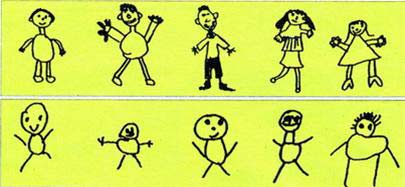Watching television a lot reduces creativity
According to a study in Germany, watching TV for many hours limits the intellectual development of children.
At first glance, these drawings are smudged images. But for Peter Winterstein - the pediatrician, these are 'small windows that show children's intelligence'. For the past 17 years, this doctor has done many tests for students aged 5-6 at Bade Wurtemberg (Germany). And sometimes he asked the children to draw people figures.
Some bodies had arms, fingers, ears and legs, but he noticed some images that were deformed. Two hands drawn from hips and legs drawn from the head. For Winterstein, the main cause of this delay is television. He examined his theory with more than 1,900 children in Goppingen county (southwestern Germany).

'Child's small window of wisdom' .The picture above is because the kindergarten children watch TV for less than an hour every day, while the lower row of photos by the children watching TV over three hours a day is done.
These research results are surprising. Pictures of children watching television less than an hour a day are full of parts, while their drawings of TV watching more than three hours a day are rarely full of parts.
In order to evaluate these drawings, Winterstein and his colleague Robert J. Jungwirth set up a scale and took the maximum score of 13. They first saw whether the drawing was full of parts. For every detail like hair, eyes, nose, body or leg, they scored 1 point. They do the same for whether the head, body, and limbs are proportional.
Winterstein considered this technique to be noteworthy to understand how preschoolers perceive drawings. The results were significant: children who watched television less than an hour a day had an average score of 10.4 / 13, while children who watched TV for more than three hours a day had an average score of 6.4 / 13 and this is the lowest result, which accounts for 10% of the drawings.
With this study, Winterstein agreed with doctors like Manfred Spitzer, neurophysiologist and director of the University of Ulm's medical center, as they constantly paid attention to families against the consequences of Watching TV for many hours in children. Spitzer explains that a mind only collects things if children discover them by combining multiple senses, ie hearing, sight, smell and touch.
According to him, from this point of view, television is a poor source of information when compared to the real world . These arguments are also reinforced by new studies in the US: comparative tests are done with thousands of children in 30 years. The result: the more people watch television when they are young, the worse their education is at age 26.
Statistics in 2005 in Germany, 3-5 year old children watch TV on average 71 minutes a day and age 13 watch TV 108 minutes a day. These figures seem normal, but researchers still have a direct link between television and learning decline. Socially, however, according to a study conducted at Rhénanie - du - Nord - Westphalie, with nearly 5,500 children, the less children see television, the more they feel they live in harmony with their families.
Peter Winterstein said it can be demonstrated that the effect of television on children's development is worse than the mother smoking nicotine when pregnant with that child.
UA
- Addicts watching TV are at high risk of premature death
- Children with television addiction are more likely to use violence
- Limit the time of watching television for children
- To reduce fat and sleep well, limit watching television
- Interesting things about TV around the world that you may not know
- Watching television is bad for children
- What do you know about 19th-century television with
- The history of television development
- Future health risks when sitting in front of the screen
- Listen to the radio happier than watching television and surfing the web
- The dark side of creativity
- Early death 5 years by watching TV
 Green tea cleans teeth better than mouthwash?
Green tea cleans teeth better than mouthwash? Death kiss: This is why you should not let anyone kiss your baby's lips
Death kiss: This is why you should not let anyone kiss your baby's lips What is salmonellosis?
What is salmonellosis? Caution should be exercised when using aloe vera through eating and drinking
Caution should be exercised when using aloe vera through eating and drinking Seeds became the 'secret weapon' that helped 4 children in a plane crash survive 40 days in the forest
Seeds became the 'secret weapon' that helped 4 children in a plane crash survive 40 days in the forest  Dangerous diseases that require vaccination from a young age
Dangerous diseases that require vaccination from a young age  If you put babies together without anyone teaching them to speak, will a new language emerge?
If you put babies together without anyone teaching them to speak, will a new language emerge?  The concubines, though favored by the king, had no children: An autopsy revealed the truth!
The concubines, though favored by the king, had no children: An autopsy revealed the truth!  How important are micronutrients to the human body?
How important are micronutrients to the human body?  Ancient Handprints on the Qinghai-Tibet Plateau: Unique Evidence of Human Evolution
Ancient Handprints on the Qinghai-Tibet Plateau: Unique Evidence of Human Evolution 